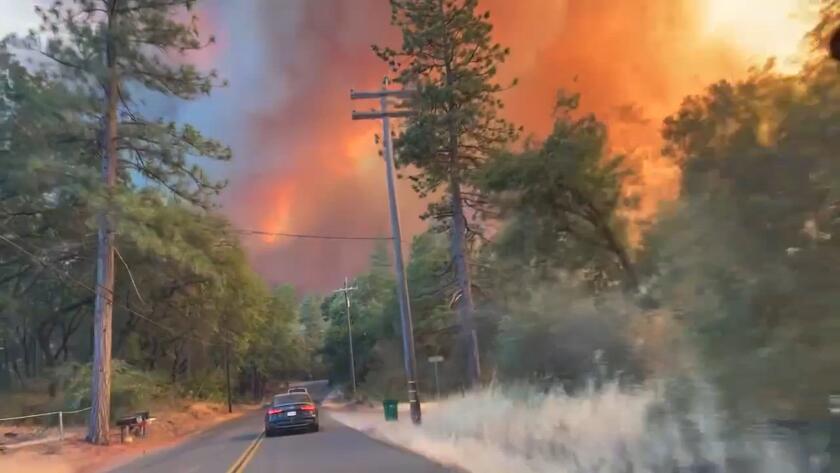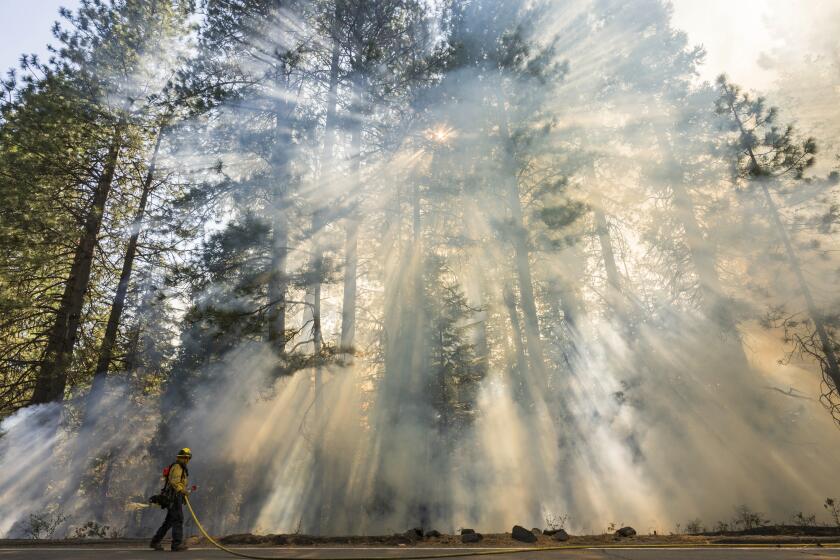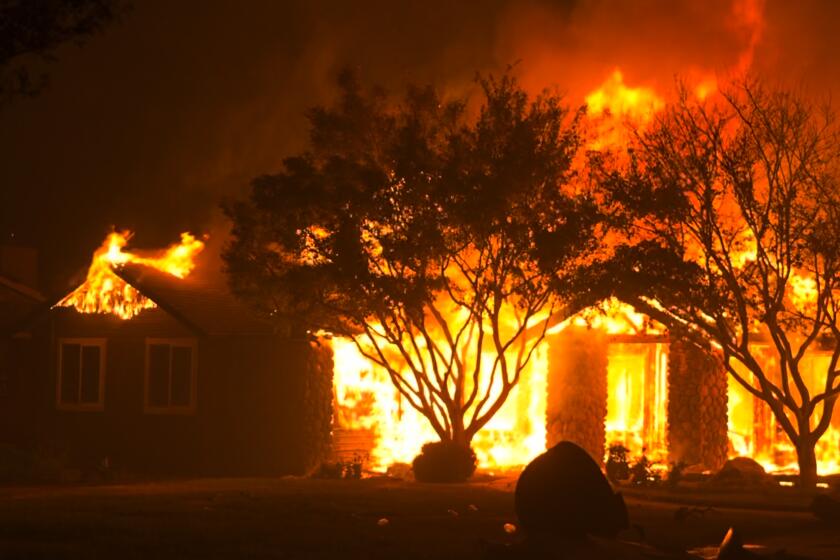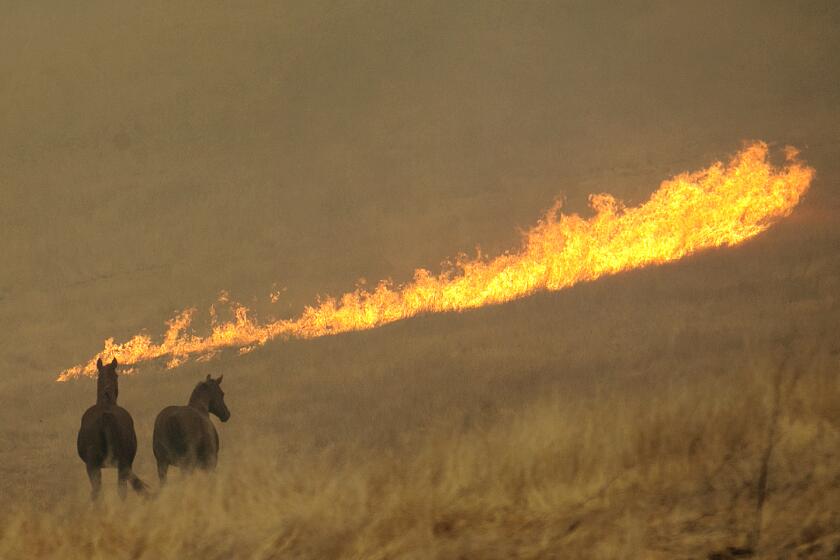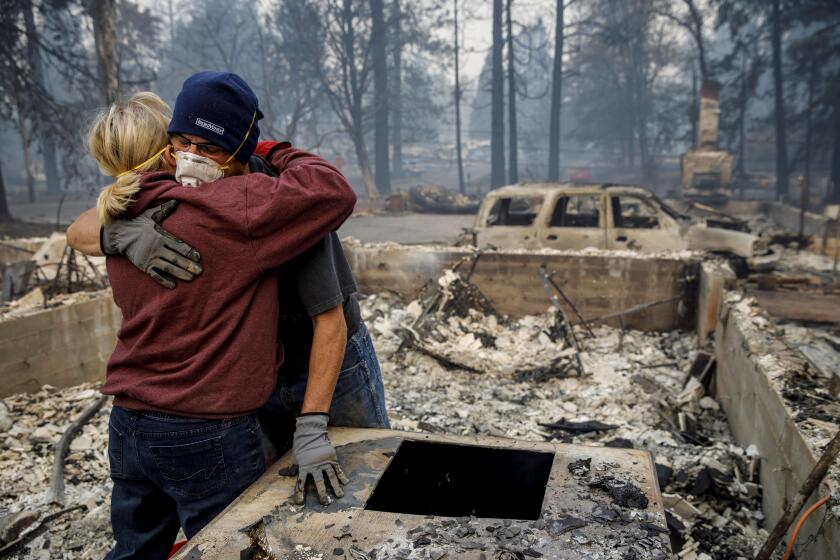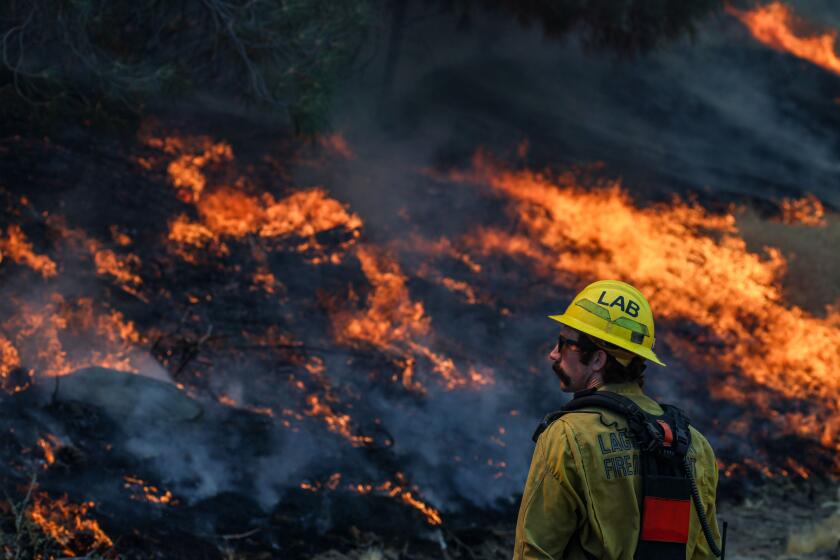Displaced again: California family loses home in Park fire, years after relocating from Paradise
Kristy Daneau takes a video as she and her family evacuate from Cohasset, just north of Chico, as the Park fire moves closer. Their family home would eventually burn to the ground, as their last home did in Paradise in 2018.
Underneath a blazing orange-and-yellow sky, with massive smoke plumes billowing seemingly from every direction, the Daneau family made a desperate drive for safety.
But their three-car caravan didn’t get far. The explosive Park fire had crossed over the only route out of Cohasset, a mountainous enclave on the outskirts of Chico. The Daneaus, firefighters said, would need to turn around.
Kristy Daneau started hyperventilating. Scarcely 30 minutes earlier, she, her husband and their 17-year-old daughter had rushed to pack up what they could — a few important documents, some clothes and their five dogs — before taking off south on the community’s main two-lane road.
It was frightening, and all too familiar. The family had previously been forced to flee as a wildfire bore down on another mountain town they called home: Paradise.
Now, with their path blocked and a horizon swallowed by flames, Kristy had an eerie feeling they were going to lose all they’d fought to build.
“I kind of knew then, like, we’re never coming home again — again, again,” she said.
The Park fire north of Chico has become California’s sixth largest in history. Weather and terrain could continue to create challenges for controlling the blaze.
The Camp fire, the deadliest in California history, devastated Paradise in 2018, consuming thousands of homes, including the Daneaus’.
They relocated to the town of Cohasset, putting them in the direct path of another wildfire, one that has since become the state’s fifth largest on record. Within just six years, the family again found themselves in jeopardy.
The trio eventually made it to safety, trekking seven hours down an unpaved loggers’ road to Chico. But their home in Cohasset was no match for an inferno’s fury.
“We’re starting completely over, again,” said Michael Daneau, 41. Every property they’ve ever owned has “burned to the ground with no value and nothing to our name.”
Speaking from his father’s house in Chico, where the Daneaus are staying temporarily, Michael still seemed stunned at their misfortune.
“Not once, but twice. What are the odds?” he said.
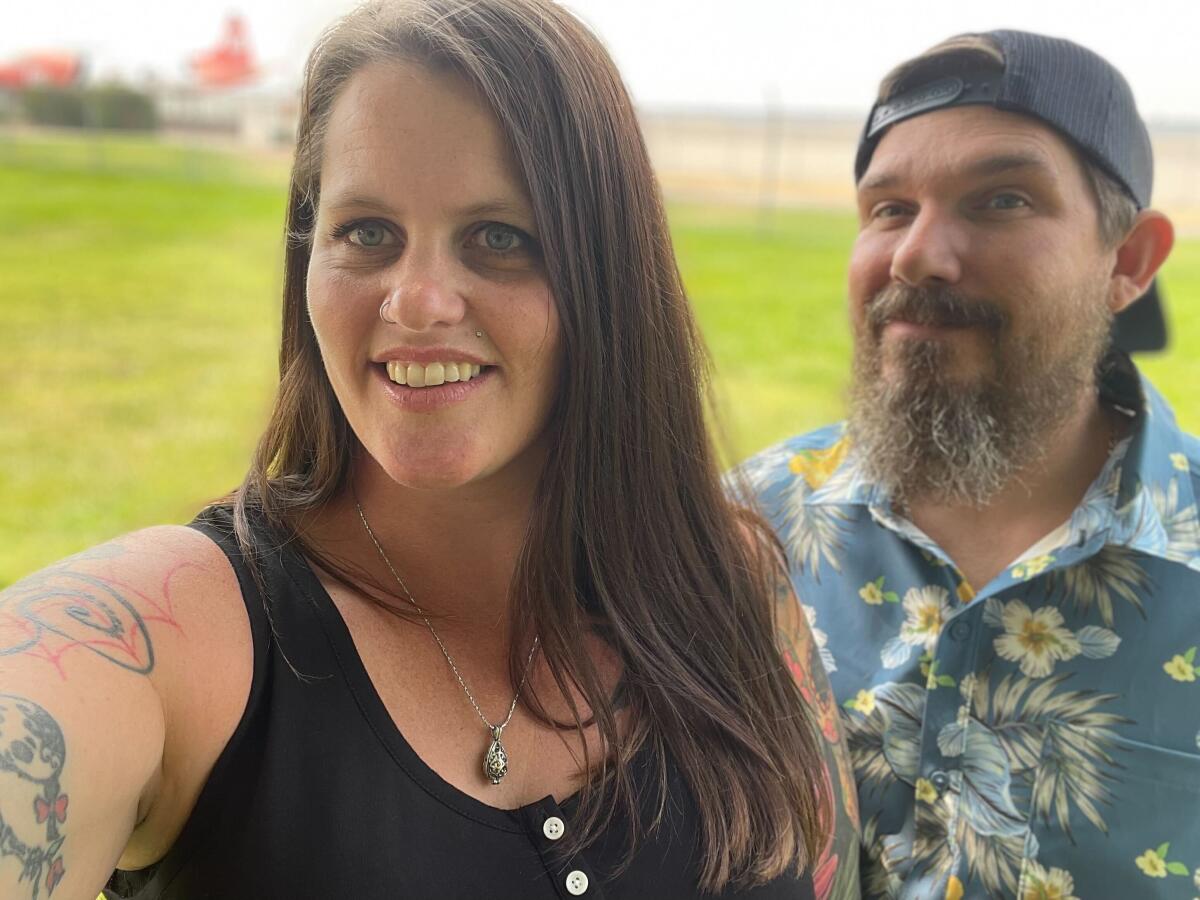
A few days after the fire passed through Cohasset, a neighbor confirmed their worst fears. Their home was a total loss.
Another neighbor sent photos Monday of what little was left standing: a brick fireplace and some metal appliances; a small, stone Buddha statue, now meditating over piles of ash and burned rubble instead of a green garden.
“Our house was just like it was before in the Camp fire — just barely anything standing,” Michael said. “The two-story house is just nothing now.”
The Park fire ignited on July 24 after officials say a man intentionally pushed his burning car into a gully. The fast-moving blaze has now surpassed 390,000 acres.
Although early evacuation orders helped residents avoid danger, dozens of homes in Cohasset, and elsewhere, have been destroyed.
A wildfire burning northeast of Chico has swelled to more than 164,000 acres, sending thousands of residents fleeing in the night.
The latest assessments have confirmed more than 480 structures across Butte and Tehama counties, many of them residential, were ruined in the Park fire, according to the California Department of Forestry and Fire Protection. An additional 10,800 remain threatened.
The Daneaus estimated that about 10 other families from Paradise also relocated to Cohasset — one of the few affordable options they could find in the area, still close to family, their kids’ schools and their jobs.
Several of them also lost their homes to the Park fire, the couple said.
“We’ve already been through this, we know what it’s like. We know the heartache, we know the pain,” Michael said. “We know what it’s like to have to rebuild your life completely from the ground up.
“We have a better outlook on it purely because we’ve been through it — not that it’s easier,” he said.
Recovery, the Daneaus expect, will actually be much harder, as they were without fire insurance this time around. Insurance on their Paradise home was their saving grace six years ago — how they were able to buy a new house, to feel some security again.
Now they aren’t sure what will come next.
“We never imagined putting ourselves in this situation,” Michael said. “We never would have bought the house if we thought that in a few short years ... that we would not be able to afford insurance.”
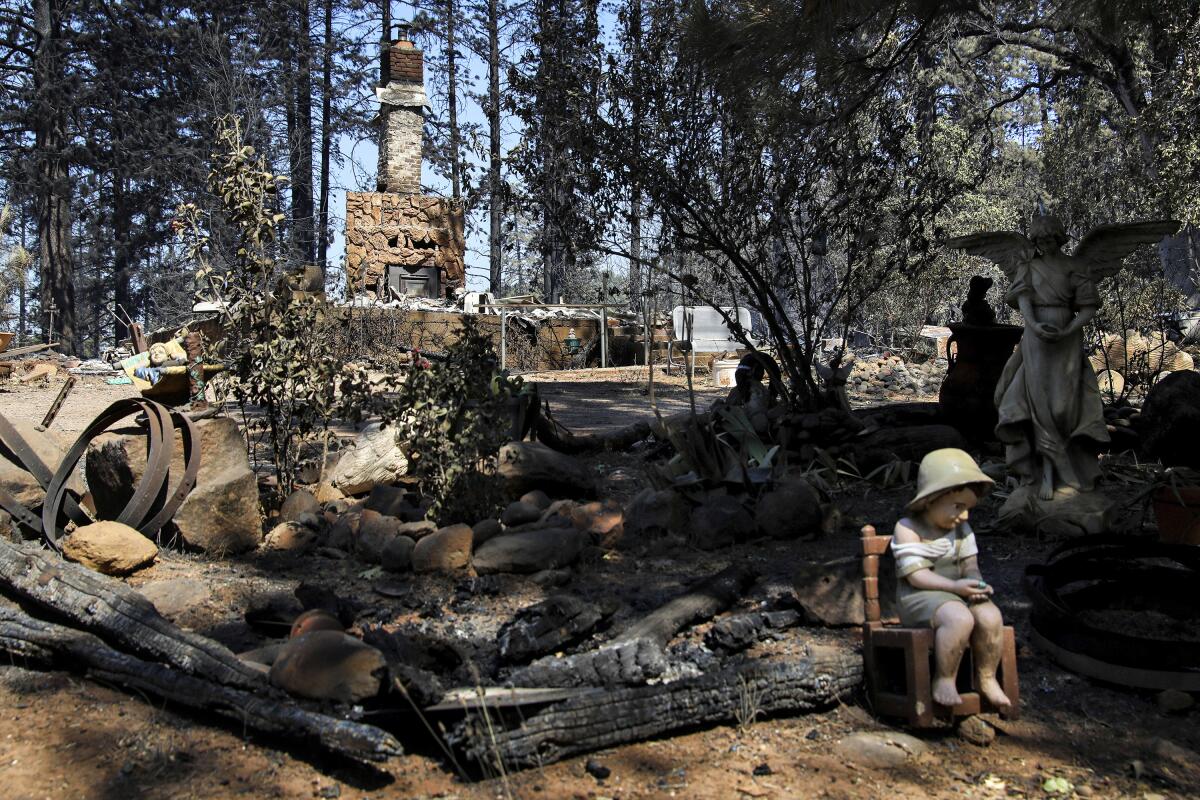
The first two years they were able to afford fire insurance through the California FAIR plan — the state’s last-resort insurance program and the only provider that would offer them coverage, given the home’s location. The premium started out at about $7,000 a year, then went up to $10,000. By the third year, they were quoted a price of more than $12,000, something they couldn’t afford.
“The California FAIR plan is just not fair,” Michael said. A longtime electrician, he recently took a job at the Chico Unified School District, where his wife also works.
But they are trying to stay positive. It helps that, the day after they evacuated, their eldest daughter went into labor, delivering a healthy baby boy — their first grandchild.
“He’s beautiful,” said Kristy, 38. “So he’s kept us very distracted. He’s our silver lining in all of this.”
Filed on behalf of more than 365,000 policy holders, the class-action lawsuit accuses the state’s insurance of last resort of unlawfully selling subpar fire insurance policies.
“We’re trying to be as positive as we can,” her husband said. “We know that even though we’re in a worse position than we were last time, by far ... we have an amazing support group and community.”
A friend started a GoFundMe page for them, and they’re trying to focus on their new role as grandparents — even though the future they’d envisioned has changed dramatically.
“That was our house [where] our grandson ... was supposed to come spend his summers,” Michael said.
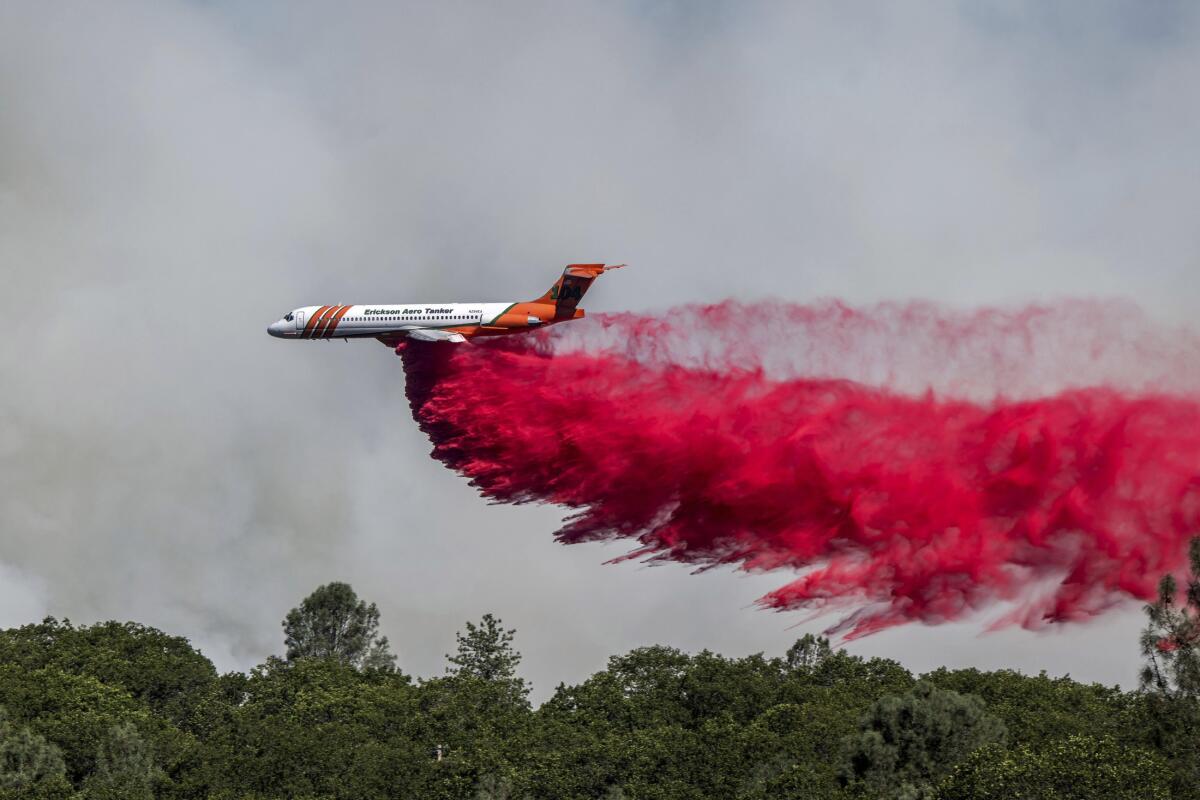
The Cohasset community has rallied around those who lost their homes, selling “Cohasset Strong” clothing to raise money for fire victims. Dan Holmes, president of the Cohasset Community Assn., estimated that about half of the area’s residences had been destroyed. But he knows the toll could have been much worse.
“The greatest thing about this is we didn’t lose anybody, and we don’t have the county up there looking for bodies, which is just truly amazing,” Holmes said. There have been no deaths or major injuries confirmed in the Park fire, unlike in 2018, when the Camp fire killed 85 people and destroyed Paradise. Paradise is only about 13 miles southeast of Cohasset, as the crow flies.
“The Camp fire scared us all; it really showed us the reality of what a disaster could be if it hit us,” Holmes said. “A lot of us have been getting ready for this.”
The Camp fire in Paradise revealed vulnerabilities in forest management, electrical equipment, city planning and evacuations. Has the state made strides against those shortcomings?
Local officials had been working hard to prepare Cohasset for wildfires, clearing brush, planning emergency procedures, supporting a volunteer firefighting team and procuring potentially necessary tools, such as radios to use if cell service failed, Holmes said. He thinks all that helped, but he also knows they got a little lucky.
“It happened at the right time of the day … communication lines hadn’t dropped; they gave us an early evacuation warning,” Holmes said.
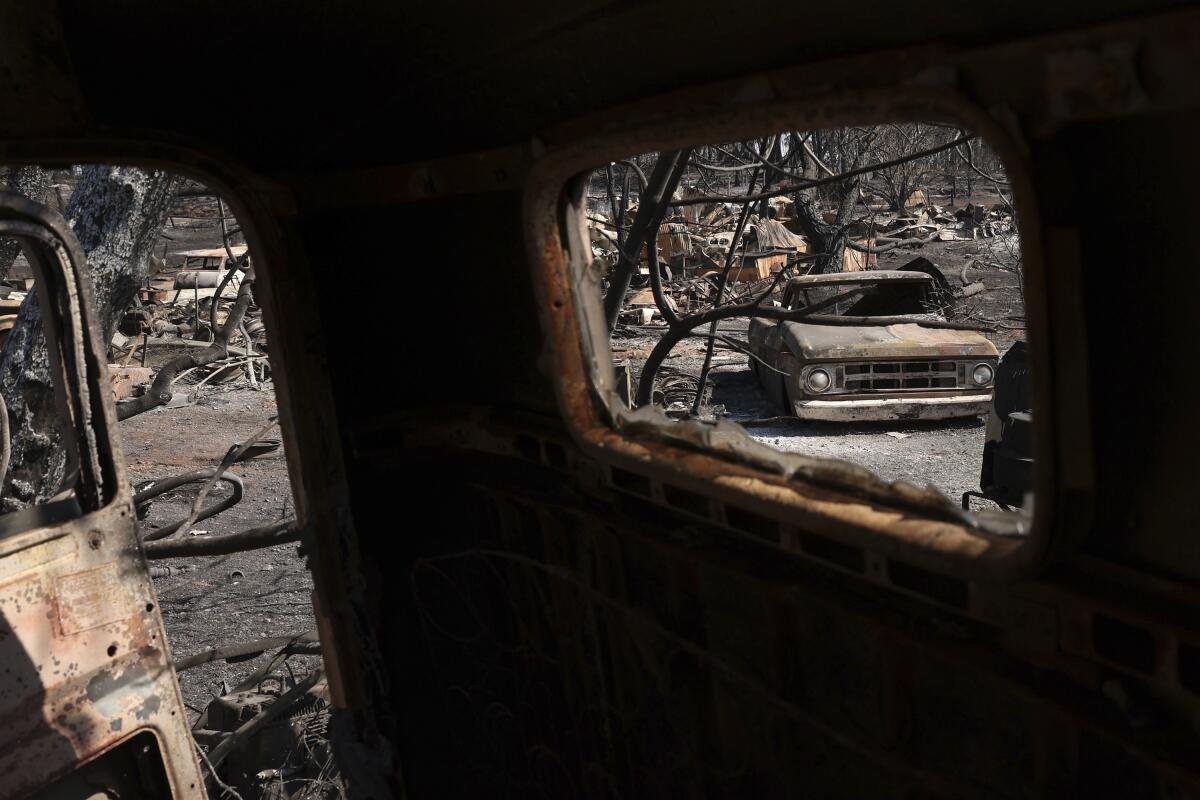
But there was no such luck when it came to the fire’s origins. It ignited just south of Cohasset, and a blend of wind, hot weather and dry fuels pushed it north, fast and hot.
“It was one of those series of unfortunate events, that perfect storm,” said Diane Stanfield, a longtime Cohasset resident who also lost her home in the monstrous blaze.
When the evacuation warnings first went out, Stanfield was at a doctor’s appointment in Chico. She made it back with her son and husband to pack up what they could from the home where the family had lived since 2000. She was only able to find one of her cats, and the family had no way to carry out their cockatiel, so she left behind extra food and water and hoped for the best.
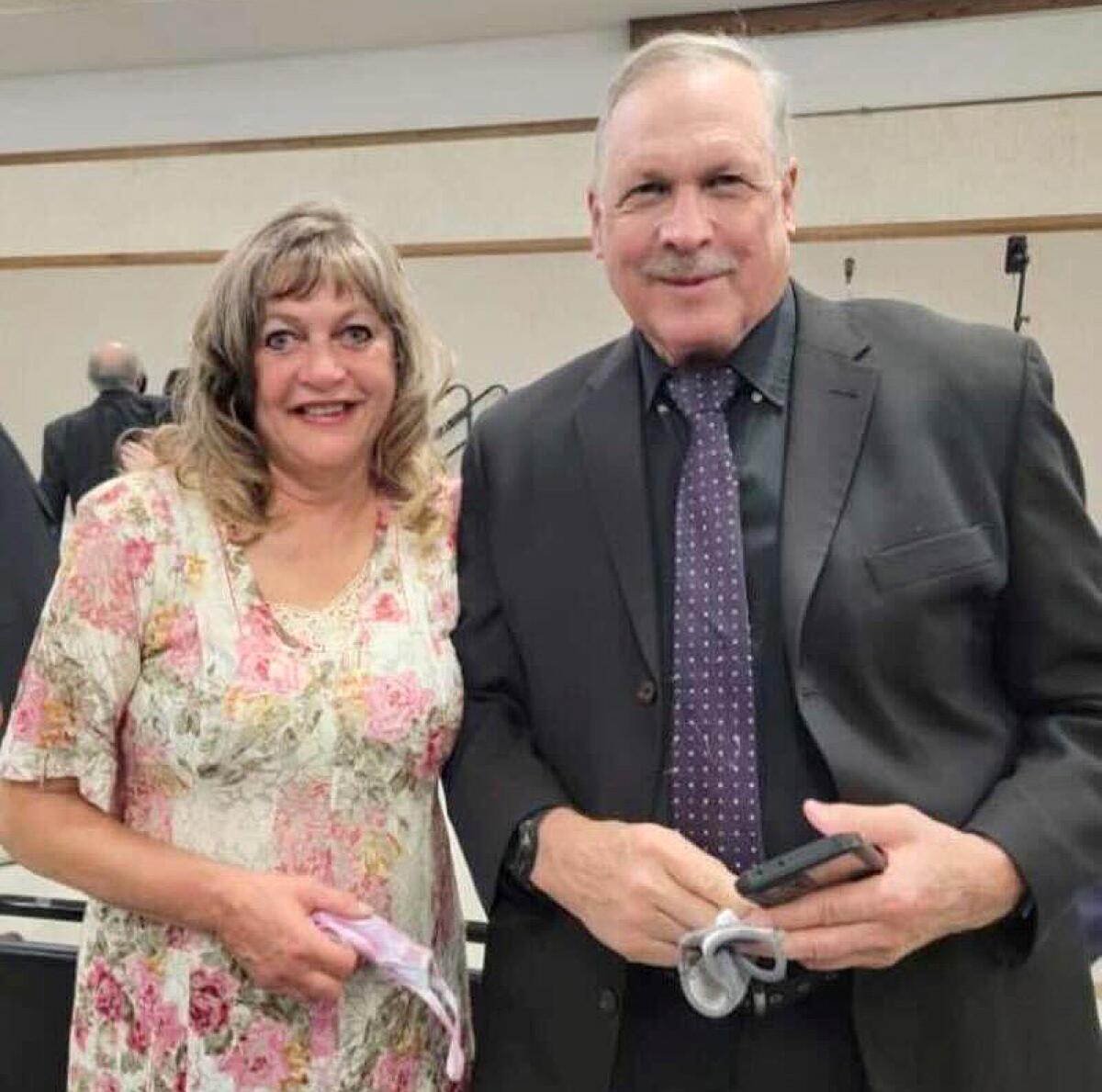
Her beloved pets fell victim to the fire as it destroyed the family’s home.
It’s hard for Stanfield to talk about her cat, Mrs. Z, without getting choked up. But she reassures herself that the fire was so dangerously hot that her animals didn’t suffer.
“I’m OK during the day … but I don’t sleep at night,” Stanfield said. “The true [grief] won’t hit until I see it. ... I loved my place.”
The Stanfields had fire insurance, but it’s still hard to think about all they lost across their 2.25-acre property.
“Even if we put all that we lost down, there’s no way it will cover everything,” Stanfield said.
It’s not even the midpoint of summer in California and wildfires have already scorched more than 751,000 acres, straining firefighting resources, forcing evacuations and destroying homes.
It’s the sentimental items — family photos, her music collection, VHS tapes of her late parents, family heirlooms — that are hardest to think about.
“All those memories are gone,” she said. Her mind keeps returning to the song “Where Do I Go From Here?” by the Carpenters.
“That song kept hitting me: Where do we go from here?” Stanfield said. “I think I want to be back where I was, that’s my hope.”
But she also worries that Cohasset won’t feel like the same peaceful, beautiful community she has loved for decades.
Kristy Daneau and her husband also aren’t sure what will come next, but they don’t think they could move back to Cohasset, or anywhere like it.
“I really, really loved living in the mountains,” she said. “But honestly I don’t think I’ll ever be able to live in the mountains again.”
More to Read
Sign up for Essential California
The most important California stories and recommendations in your inbox every morning.
You may occasionally receive promotional content from the Los Angeles Times.
